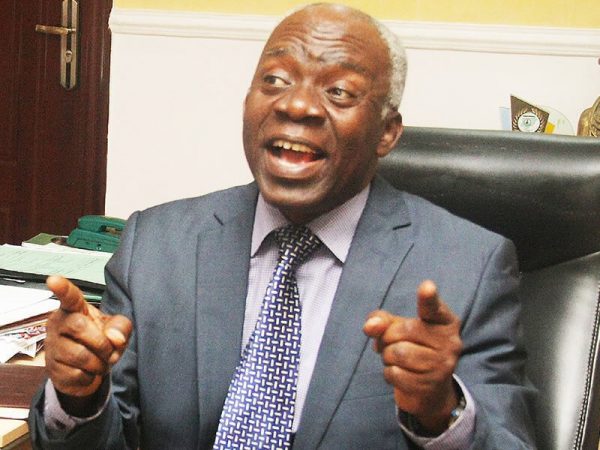Human rights activist, Femi Falana has accused the United States, Switzerland, the UK and other western nations of hypocritical behavior in Nigeria’s quest to recover loot stashed in their banks, identified the US as the country concerned.
He stated this during the seminar organised by the Socio-Economic Rights and Accountability Project (SERAP).
He said: “Nigeria traced part of the Abacha loot (over $300m) to Jersey, an island in the United Kingdom. The Attorney-General filed a process to – by the way I was in that country when the person was convicted. The money left Nigeria through Kenya and landed in Jersey. It was from the late Abacha.
“Nigeria wanted to collect the remaining loot. But the United States filed an objection, saying the money could not be released to Nigeria.
“The court asked why; the US said if the money must be released, it should be released to the US government, so that ‘we can manage it for Nigeria.’
“The other one, $321 million, Switzerland, a notorious conduit for corruption, had the temerity to say that ‘unless the World Bank is going to manage this money, we are not going to release this money.’”
Falana urged the Federal Government not to depend on the West in its loot recovery drive.
“The United Nations Convention Against Corruption has made adequate provisions against corruption, mandating countries to assist each other but western countries have not been helping us. Our government should stop relying on the west.”
He said he had advised, and the government was considering, suing foreign banks illegally holding onto funds stolen from Nigeria.
He added: “From five cycles of independent audit reports covering 1999-2012 the National Extractive Industries Transparency Initiative revealed that the Nigerian National Petroleum Corporation, some oil companies and certain agencies of the Federal Government have withheld $20.2 billion from the Federation Account.
“In 2006, the Central Bank of Nigeria removed $7 billion from the nation’s external reserves and placed same as deposit in 14 Nigerian banks. In 2008, the Bank gave a bailout of N600 billion ($4 billion) to the same banks. Up till now the CBN has failed to recover the said sum of $11 billion from the banks.”
“On September 6, 2016 the Nigerian National Petroleum Corporation (NNPC) announced that arrangements had been concluded to recover the sum of $9.6 billion in over-deducted tax benefits from joint venture partners on major capital projects and oil swap contracts. The NNPC is said to have recovered the said sum of $9.6 billion but has not remitted same into the Federation Account.”
Falana spoke also of plans to seek redress for the 21 coal miners allegedly murdered by the British police under the colonial rule in Nigeria.
Falana said: “The British government, the British police killed 21 miners in Enugu on November 18, 1949. We are talking to the victims and their children to do what the Kenyans have done by suing the British government so that we can also begin to ask for reparation for our people.”
Obono-Obla, who refrained from political comments because he had been “gagged”, said there would be no sacred cow in the quest to recover fraudulently acquired assets.
Obono-Obla said: “Without mentioning names, we are currently investigating a director in a Federal Government ministry…We saw so much and we went to the Code of Conduct Bureau, got his asset form and discovered that a lot of companies that he has been using to make money were not mentioned in his assets declaration form. The man is in soup.”
The Special Assistant to the President on Prosecutions urged Nigerians to assist it with information on assets procured with stolen funds.
“If you don’t give us information, we may not know. The panel has powers to investigate public officers in the three tiers of government: federal, state and local. No sacred cows, as far as I am concerned. We must investigate everybody. Any complaint that requires an investigation will be investigated,” Obono-Obla said.
SERAP director Adetunbo Mumuni praised the government for mustering the will to tackle corruption.
“Before President Muhammadu Buhari came, we knew there was massive corruption, but this administration has made attempts to bring corrupt people to justice,” he said.
Other guests at the event included Amnesty International Country Director Mrs Osai Ojigho; Department for International Development (DFID)’s Sonia Warner and Ford Foundation’s Ms Eva Kouka and Ms Linda Ochiel, among others.

